Pecan Tree Toxicity - Can Juglone In Pecan Leaves Harm Plants
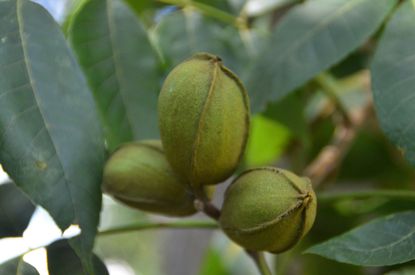

Plant toxicity is a serious consideration in the home garden, especially when children, pets, or livestock may be in contact with potentially harmful flora. Pecan tree toxicity is often in question due to the juglone in pecan leaves. The question is, are pecan trees toxic to surrounding plants? Let's find out.
Black Walnut and Pecan Tree Juglone
The relationship between plants wherein one produces a substance such as juglone, which affects the growth of another is called allelopathy. Black walnut trees are fairly notorious for their toxic effects to surrounding juglone sensitive vegetation. Juglone doesn't tend to leach out of the soil and may poison nearby foliage at the circumference of twice the radius of the tree's canopy. Some plants are more susceptible to the toxin than others and include:
Black walnut trees have the highest concentration of juglone in their buds, nut hulls, and roots but other trees related to the walnut (Juglandaceae family) produce some juglone as well. These include butternut, English walnut, shagbark, bitternut hickory, and the aforementioned pecan. In these trees, and specifically with regards to juglone in pecan leaves, the toxin is generally minimal and does not affect most other plant species.
Pecan Tree Toxicity
Pecan tree juglone amounts do not usually affect animals unless ingested in large amounts. Pecan juglone can cause laminitis in horses. It is not recommended that you feed pecans to the family dog either. Pecans, as well as other nut types, can cause gastric intestinal upset or even an obstruction, which can be serious. Moldy pecans may contain tremorgenic mycotoxins which can cause seizures or neurological symptoms. If you have had problems with plant failings near a pecan tree, it may be wise to replant with juglone tolerant species such as:
- Arborvitae
- Autumn olive
- Red cedar
- Catalpa
- Clematis
- Crabapple
- Daphne
- Elm
- Euonymus
- Forsythia
- Hawthorn
- Hemlock
- Hickory
- Honeysuckle
- Juniper
- Black locust
- Japanese maple
- Maple
- Oak
- Pachysandra
- Pawpaw
- Persimmon
- Redbud
- Rose of Sharon
- Wild rose
- Sycamore
- Viburnum
- Virginia creeper
Kentucky bluegrass is the best choice for lawns near or around the tree. So, the answer to, “Are pecan trees toxic?” is no, not really. There is no evidence that the minimal amount of juglone affects surrounding plants. It also has no impact when composting and makes excellent mulch due to its easily crushed leaves that are slow to decompose.
Gardening tips, videos, info and more delivered right to your inbox!
Sign up for the Gardening Know How newsletter today and receive a free download of our most popular eBook "How to Grow Delicious Tomatoes."

Amy Grant has been gardening for 30 years and writing for 15. A professional chef and caterer, Amy's area of expertise is culinary gardening.
-
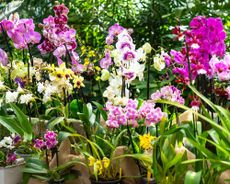 26 Different Types Of Orchids – With Pictures & Information
26 Different Types Of Orchids – With Pictures & InformationDiscover stunning orchid types to grow in your home and garden – from easy beginner varieties to rare and exotic species that are the preserve of experts.
By Melanie Griffiths
-
 Urban Composting Guide: How To Compost In The Middle Of The City
Urban Composting Guide: How To Compost In The Middle Of The CityUrban composting does not have to be daunting. You can compost in the city, and maybe even try some urban worm composting!
By Mary Ellen Ellis
-
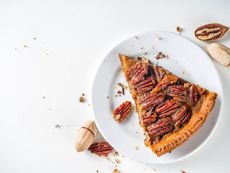 From Harvest To Table: How To Make The Perfect Pecan Pie
From Harvest To Table: How To Make The Perfect Pecan PieFall is pecan harvest time, which means it’s also time for the perfect pecan pie recipe. Read on for more.
By Amy Grant
-
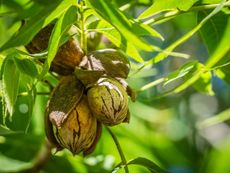 Root Pecan Cuttings – Can You Grow Pecans From Cuttings
Root Pecan Cuttings – Can You Grow Pecans From CuttingsPecans are delicious, so much so that if you have a mature tree, your neighbors are likely envious. You may want to root pecan cuttings in order to grow a few trees for gifting. Will pecans grow from cuttings though? Click here for info on pecan cutting propagation.
By Teo Spengler
-
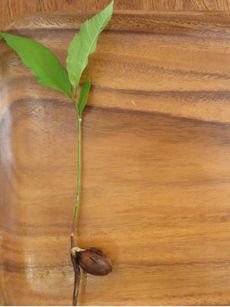 How To Plant Pecans: Learn About Sowing Pecan Seeds
How To Plant Pecans: Learn About Sowing Pecan SeedsGrowing pecans from seed is not as simple as it sounds. Sowing pecan seeds is only one step in a complex process of growing a nut producing tree. Can you plant a pecan seed? Click here to find out and get tips on how to plant pecans and pecan seed germination.
By Teo Spengler
-
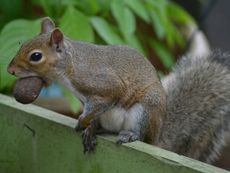 Help, Pecans Are Gone: What’s Eating My Pecans Off The Tree
Help, Pecans Are Gone: What’s Eating My Pecans Off The TreeIt’s definitely unpleasant to walk outside to admire your pecan tree and find half your nuts are gone! You may begin to wonder what could be eating your pecans. Click this article for ideas on different pests that eat pecans so you can save more of the tasty nuts for yourself.
By Teo Spengler
-
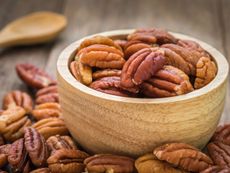 Using Pecans In The Kitchen: What To Do With Pecans
Using Pecans In The Kitchen: What To Do With PecansWith such a large quantity of nut production, one might wonder what to do with pecans. Cooking with pecans is the most common of uses, but there are other ways of using pecans. If you are lucky enough to have access to a pecan tree, learn how to use pecans here.
By Amy Grant
-
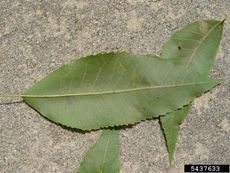 Pecan Bacterial Leaf Scorch: Treating Bacterial Leaf Scorch Of Pecans
Pecan Bacterial Leaf Scorch: Treating Bacterial Leaf Scorch Of PecansWhile pecan bacterial leaf scorch (PBLS) does not kill pecan trees, it can result in significant losses. The following article discusses the symptoms and treatment for a pecan tree with bacterial leaf scorch. Click here for more information.
By Amy Grant
-
Pecan Downy Spot Control – How To Treat Downy Spot Of Pecans
Downy spot of pecans is a fungal disease affects the overall vigor of the tree, thus pecan downy spot control is integral to its health. The following article contains information on pecan downy spot symptoms and tips for treating a pecan tree with downy spot.
By Amy Grant
-
Pecan Vein Spot Control – Learn About Pecan Vein Spot Disease
Pecan vein spot disease is caused by the fungus Gnomonia nerviseda. The disease does not appear on shoots or nuts, only foliage and only in pecan trees. The good news is that the disease is infrequent, causes little crop loss and can be prevented. This article will help.
By Bonnie L. Grant